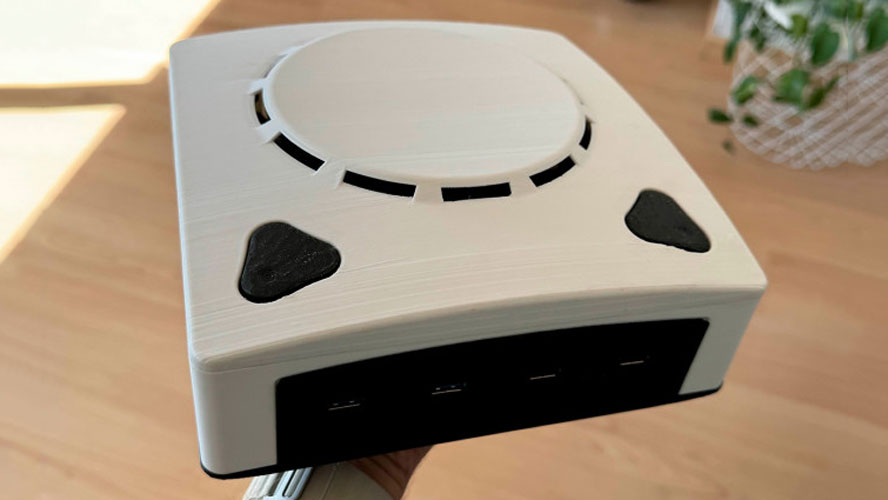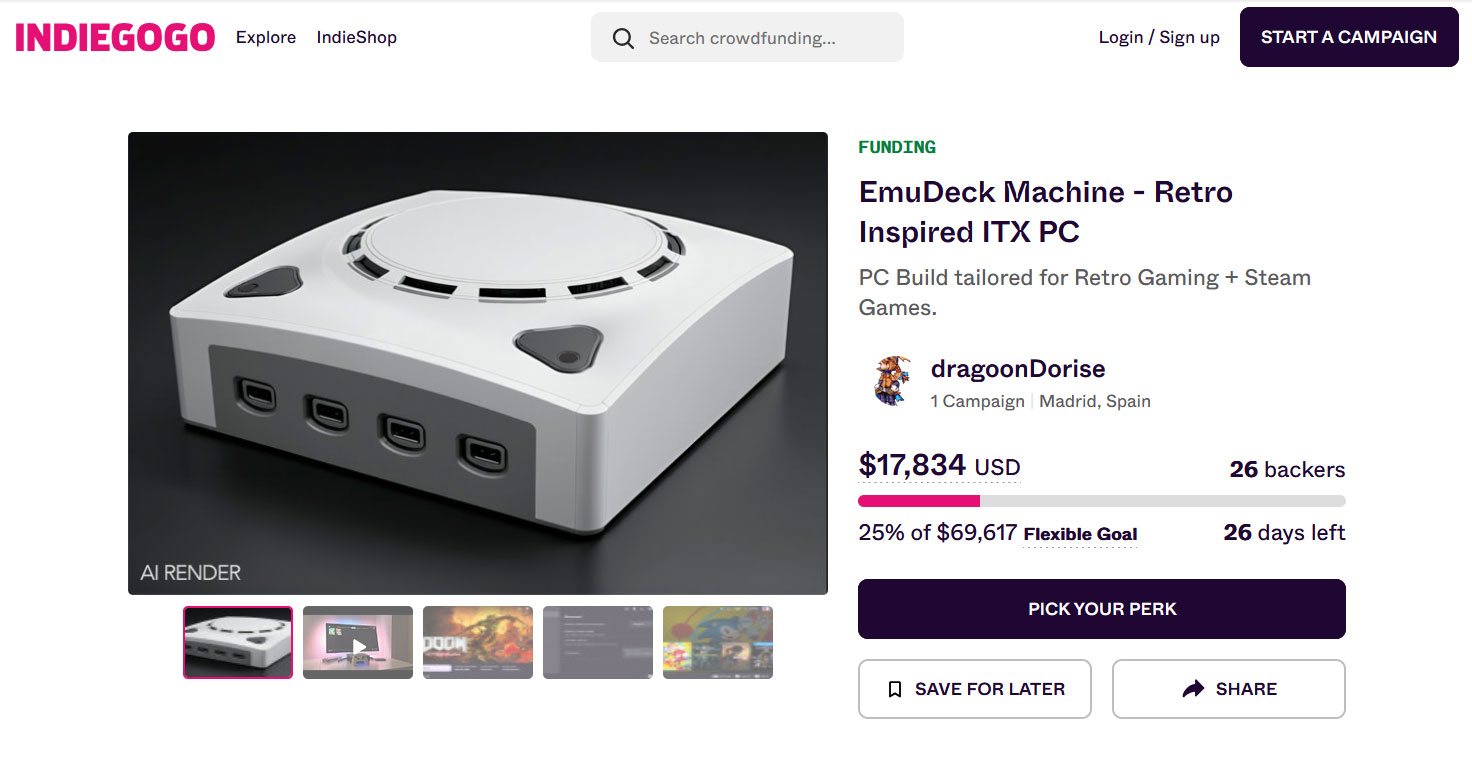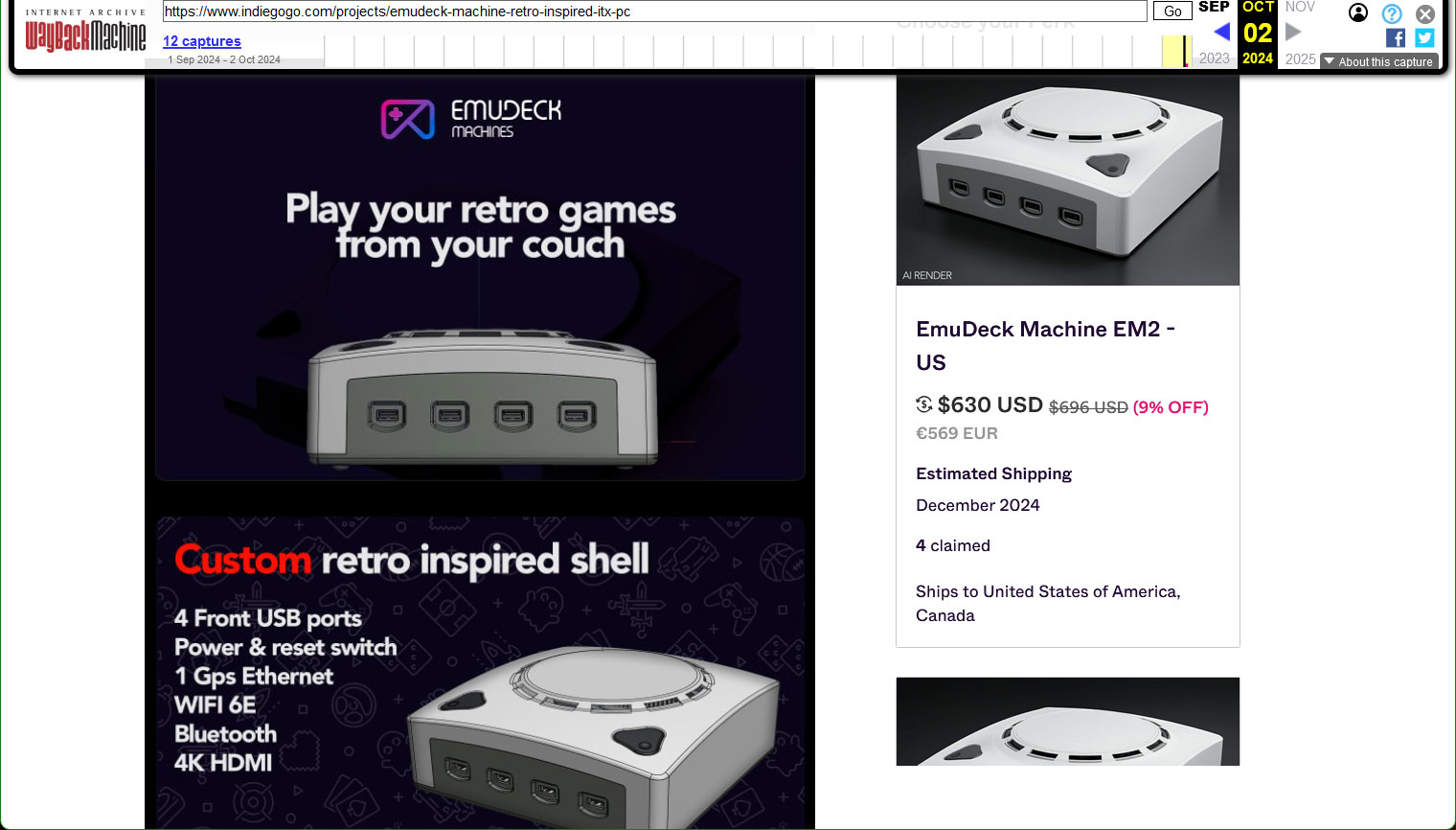EmuDeck retro gaming mini-PC crowd funder ends in tears after ‘nobody bought it’
A teased follow-up project will hopefully attract more than just six pledges.

The developers of EmuDeck have canceled an Indiegogo crowdfunding campaign for a mini-PC hardware project because “nobody bought it.” We checked the Wayback machine and discovered that just six people had pledged $600+ to get one of the finished mini-PCs before the campaign was shuttered. When the crowdfunding closed, it was only 25% funded, and EmuDeck felt there wasn’t time to rescue it. The campaign began in late August.
According to the EmuDeck Team’s social media, they are currently busy refunding the handful of enthusiasts (four from the US, two from Europe) who pledged their hard-earned cash to back the hardware project. However, the EmuDeck Team is already teasing that they are “working on something else,” so if a custom mini-PC for emulation fun would appeal to you, it may be worth watching for future announcements.



EmuDeck is best known for its popular multi-platform emulation tool, which makes it easy to install a range of emulators, support and configuration files, bezels, hotkeys, and performance fixes across SteamOS, Linux, Android, Windows, and other OSes. In this context, it is somewhat surprising they couldn’t get enough traction with a mini-PC crowdfunding project.
3D Printed prototype of the EmuDeck Machine, too bad nobody bought it! I'm canceling the project and refunding all money to the ones that did back the project since its clear it's not going to make the IGG goal pic.twitter.com/FJe32rpuiEOctober 3, 2024
The EmuDeck Machine, a retro-inspired ITX PC, offered decent specs. However, we have seen plenty of prior mini-PCs with similar hardware and even one or two with retro gaming styling. To us, it looked like a NUC cosplaying as a Sega Dreamcast.
Inside the machine would be an AMD Ryzen 7 7840 processor sporting relatively potent onboard Radeon 780M graphics. There were also plans for a Radeon RX 7600-powered eGPU dock to match the EmuDeck Machine. In what sounds like a rather fluid creation process, a DIY kit was also floated as an idea without kindling much interest.
It is good to hear that those who pledged towards this project have their money back or should do so soon. We always remind readers of the risks of crowdfunding, but at least these backers have the cash to soothe the disappointment of the failed project. Hopefully, this will be a valuable learning process for EmuDeck, and they will come back with an irresistible piece of hardware for emulation enthusiasts.
Get Tom's Hardware's best news and in-depth reviews, straight to your inbox.

Mark Tyson is a news editor at Tom's Hardware. He enjoys covering the full breadth of PC tech; from business and semiconductor design to products approaching the edge of reason.
-
Giroro Of course nobody bought it. The designer of this thing doesn't own any social media platforms, nor any television networks. They are not close personal friends with any celebrities; they don't own a 10 million device botnet. The creator of this doesn't exist, and they never will.Reply
We are in an era where a company who owns like 1/3 of all media of every type on earth can spend $200 million on ads and still fail to convince people to spend $15to go to a theater, or even to take 2 hours out of their day to watch a movie on a streaming service they've already paid for.
Everything is global. You have to have the literal best product on earth to compete, but real people do not have the resources to make that happen. Also, making it look like a dreamcast was a bad idea. -
bit_user Reply
I think your statement is too extreme. There are still plenty of kickstarter/Indigogo successes, but they to offer compelling value and/or novelty.Giroro said:You have to have the literal best product on earth to compete, but real people do not have the resources to make that happen.
It feels to me like most people really into emulation & retro gaming probably already have a decent setup that works for them. This thing costs a nontrivial amount of money for something people already have or could build themselves. That's the crux of the issue. -
edzieba Reply
I think it's less whatever all that social-media-runs-the-world twaddle is, and more that nobody actually wants a seven hundred dollarydoo NUC with a retro plastic cover on it, when they could spend several hundred less for the same or more performance.Giroro said:Of course nobody bought it. The designer of this thing doesn't own any social media platforms, nor any television networks. They are not close personal friends with any celebrities; they don't own a 10 million device botnet. The creator of this doesn't exist, and they never will.
We are in an era where a company who owns like 1/3 of all media of every type on earth can spend $200 million on ads and still fail to convince people to spend $15to go to a theater, or even to take 2 hours out of their day to watch a movie on a streaming service they've already paid for.
Everything is global. You have to have the literal best product on earth to compete, but real people do not have the resources to make that happen. Also, making it look like a dreamcast was a bad idea.
Worse, as its sold primarily as an emulation device, for all but a handful of newer consoles (topping out around the PS2/Gamecube era) a Raspberry Pi works just as well, and saves you a massive chunk of change you could use to buy a whole-ass 3D printer to produce a retro-looking shell for, and still end up ahead. -
Notton Yeah, I think they should have sold this as a raspi case or a replacement case for a popular mini-PC.Reply
IMO, it'd sell even better if it were transparent plastic. -
NinoPino Reply
Nobody bought it because there are many products that can do the same things both at hardware and software level, NUCs and batocera in primis.Giroro said:Of course nobody bought it. The designer of this thing doesn't own any social media platforms, nor any television networks. They are not close personal friends with any celebrities; they don't own a 10 million device botnet. The creator of this doesn't exist, and they never will.
We are in an era where a company who owns like 1/3 of all media of every type on earth can spend $200 million on ads and still fail to convince people to spend $15to go to a theater, or even to take 2 hours out of their day to watch a movie on a streaming service they've already paid for.
Everything is global. You have to have the literal best product on earth to compete, but real people do not have the resources to make that happen. Also, making it look like a dreamcast was a bad idea. -
Giroro Replybit_user said:I think your statement is too extreme. There are still plenty of kickstarter/Indigogo successes, but they to offer compelling value and/or novelty.
It feels to me like most people really into emulation & retro gaming probably already have a decent setup that works for them. This thing costs a nontrivial amount of money for something people already have or could build themselves. That's the crux of the issue.
Sure, every platform has cherry-picked success stories that are being constantly pushed as social proof to sell the platform itself. The top 0.01% in the world can use their connections to get a really sweet deal. It's the other 99.99 % they're cynically tricking into thinking we have a fair chance who are the problem. Platforms will only ever show the success, into a very tiny the failures were always buried.
We used to call this a pyramid scheme.
But I'm being very generous to say 0.01% which would be 10,000 hits per every million attempts. YouTube needs 300 Million losers to make a single Mr.Beast. That's probably closer to 30 Million actual real people subscribing, but still... it's an impossible ratio for anybody who thinks social media is a good way to make money. When Youtube announced their Hype system, we saw them define a small" creator in need of special help as anybody with under 500K subs. IndiGoGo is no YouTube/Google in scale since the barrier of entry is much higher, but it's the same business model created implemented by the same guild of execs who have been trying to do this since they invented Web 2.0.
There's algorithmic incentive to put funnel as many of a platform's users into growing the smallest number of people/stories/projects/channels possible - in order to deliberately make them as big as possible. Huge success goes viral, which is the most powerful promotion tool that companies have right now. It's like when Powerball dramatically lowered the odds of winning the lottery in order to make the prize pool larger. They're making way more money now from the news frenzy when the jackpot grows past $1 Billion 4 times a year then they ever did when 10x as many people were winning.
The implication is that a enough people saw this, had a chance to buy it, and then decided they didn't want it. I don't believe a significant number of potential customers ever saw this before it was cancelled. And now that it's growing into a public embarrassment for Indiegogo, I'm sure EmuDeck is being pressured into re-launching where it will suddenly become a heavily-promoted front-page success story about how IndiGoGo (or whichever one of their competitors offers more) is such a philanthropic benefactor whom is so kind to the underdog. They did it, and so will YOU! Come on over here kids, and give us all your time and money. Get rich quick, its easy!
Aww, what's that you failed? That must have been your own fault for not trying hard enough. Guess you'd better work even harder next time.
This junk isn't subtle, or new. It's just classic freshmen-level manipulation applied at a large scale. Every platform does it. I'm getting really tired of it.
I hope you're never feel the pain of being one of the millions of people who are spending years permanently ruining their lives on Hail-Mary projects that take 1,000+ hours of work just to be seen by, like, 40 people. -
Giroro ReplyNinoPino said:Nobody bought it because there are many products that can do the same things both at hardware and software level, NUCs and batocera in primis.
So you knew that this existed before they cancelled it? -
NinoPino Reply
No, but if it was the case, I had not invested a cent on a product that could be replaced by something bought from Amazon probably of better quality and at a lower price.Giroro said:So you knew that this existed before they cancelled it? -
thestryker The biggest problem with something like this is that they're not offering anything unique. It will be impossible for them to compete on price with the brands selling direct from China, and won't have the support a major OEM would. In the end it's basically just one of the NUC style systems with specifically organized USB ports running modified SteamOS.Reply
So then you're just left with the retro inspired case which doesn't have branding to suck people in. I think they'd need something along the lines of a custom hardware scaler if they wanted to sell hardware. -
jlake3 Reply
This is NOT a pyramid scheme. A pyramid scheme is an investment scam where members pay to join a "business", then their returns are based on fees they collect from recruiting further members below them instead of the sale of goods or services. YouTube is not a pyramid scheme simply because there are many people who don't make enough to quit their day job for every superstar.Giroro said:Sure, every platform has cherry-picked success stories that are being constantly pushed as social proof to sell the platform itself. The top 0.01% in the world can use their connections to get a really sweet deal. It's the other 99.99 % they're cynically tricking into thinking we have a fair chance who are the problem. Platforms will only ever show the success, into a very tiny the failures were always buried.
We used to call this a pyramid scheme.
For whatever it's worth, the news of their crowdfunding campaign got picked up here on TomsHardware, The Verge, Ars Technica, Lilputing, XDA, GamingOnLinux, and more. Ars and The Verge have a combined 94 comments, a lot of which are about... cost, lack of hardware experience as a company, lack of differentiating features, and concern over viability of the campaign. They posted it on the EmuDeck subreddit and got >300 upvotes and more than 100 comments... many of which were similarly critical.Giroro said:The implication is that a enough people saw this, had a chance to buy it, and then decided they didn't want it. I don't believe a significant number of potential customers ever saw this before it was cancelled.
You seem to be assuming/implying there was some kind of deliberate effort to suppress word of the campaign, but it got more articles than it had pre-orders.
This is one of only two news stories about the campaign failing, and the other one attracted no comments. IndieGoGo campaigns fail all the time; it hardly seems like this is some type of public embarassment for the platform.Giroro said:And now that it's growing into a public embarrassment for Indiegogo, I'm sure EmuDeck is being pressured into re-launching where it will suddenly become a heavily-promoted front-page success story about how IndiGoGo (or whichever one of their competitors offers more) is such a philanthropic benefactor whom is so kind to the underdog. They did it, and so will YOU! Come on over here kids, and give us all your time and money. Get rich quick, its easy!